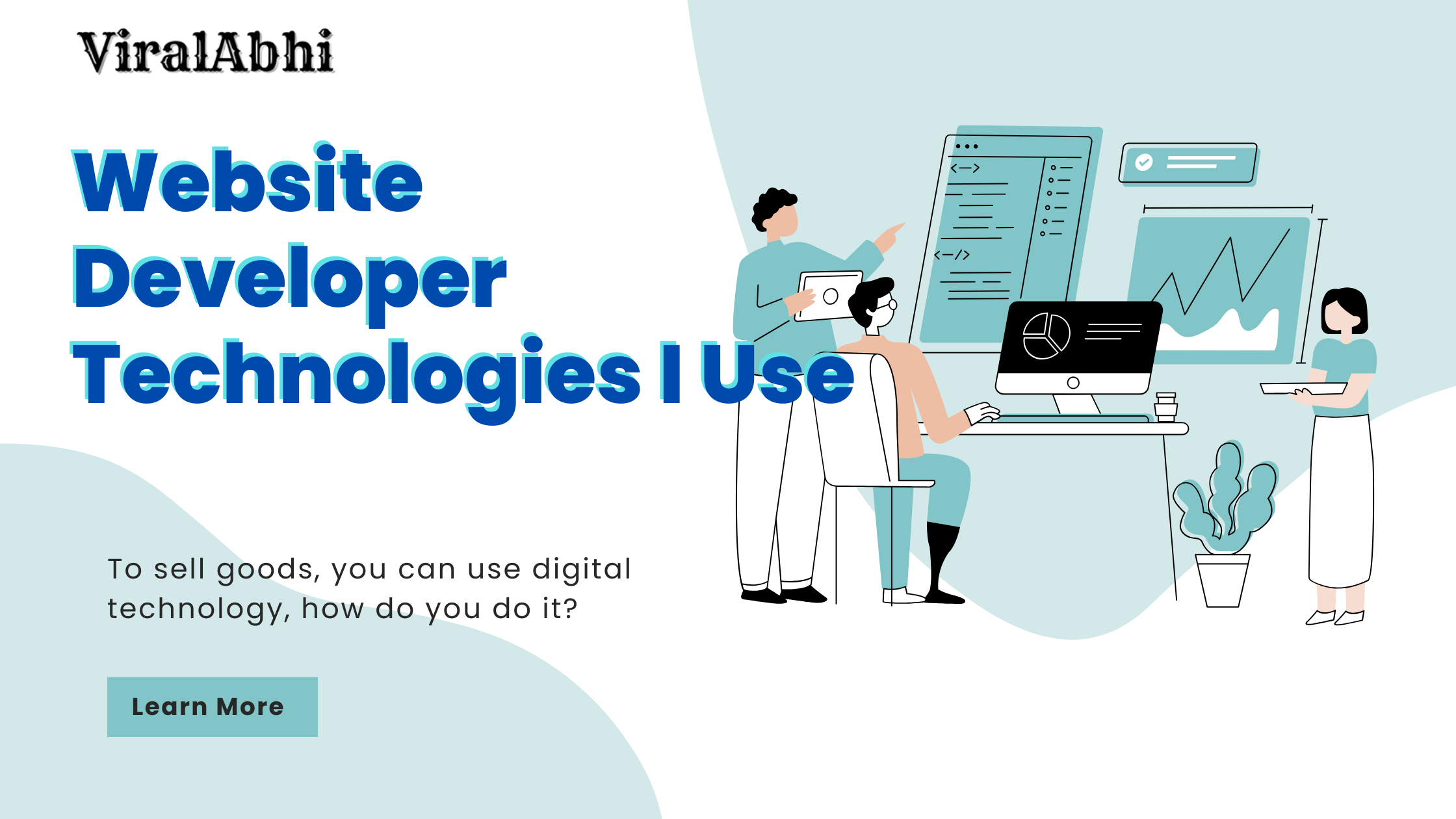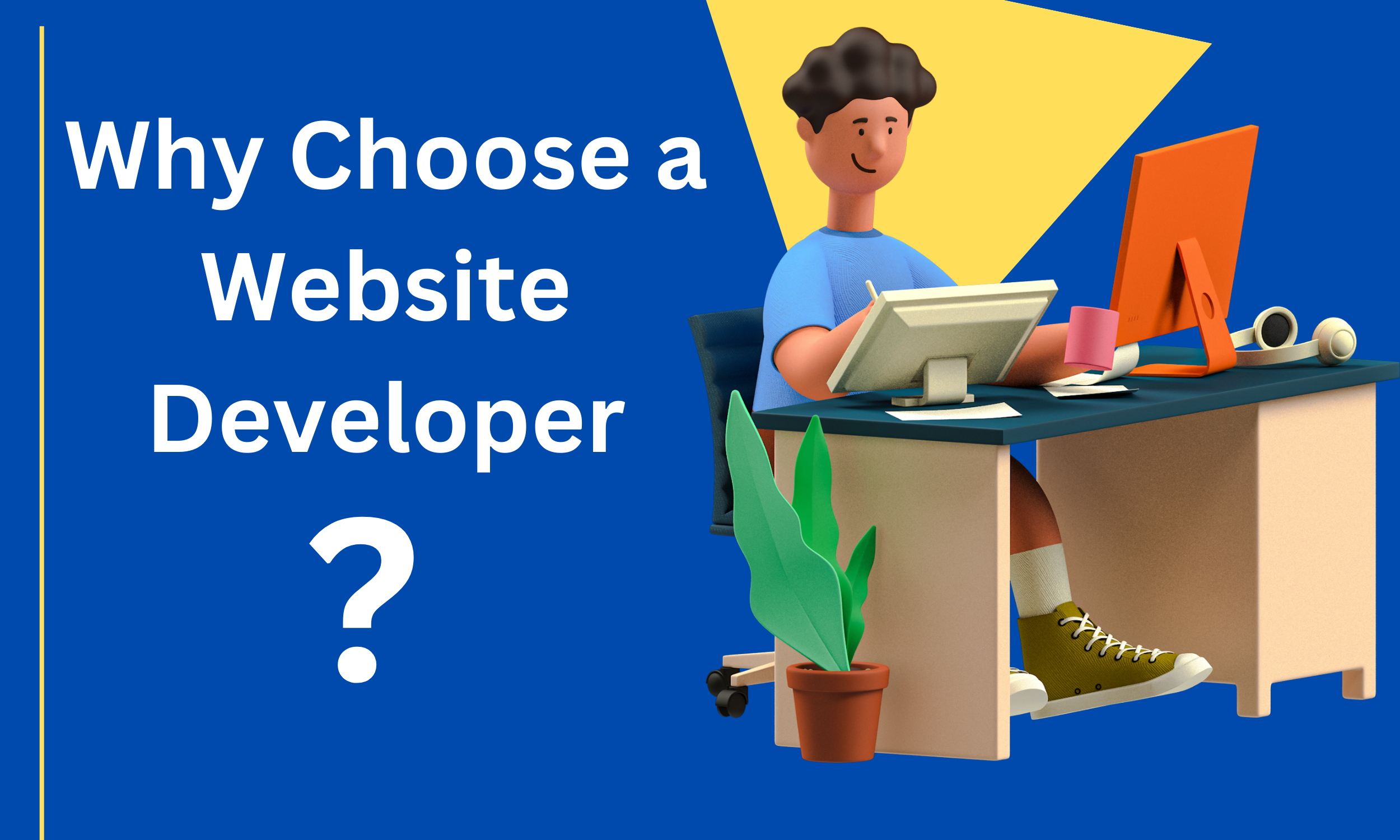Website Developer Technologies I Use

In today’s competitive digital landscape, choosing the right technologies for website development is crucial to creating a website that is fast, responsive, and optimized for both users and search engines. As a website developer, my goal is to stay ahead of the curve by using the latest and most effective tools and technologies that ensure exceptional performance, user experience, and scalability.
In this article, I’ll walk you through the essential website development technologies I use, and how they help in crafting websites that are both functional and future-proof.
1. HTML5 and CSS3:
At the core of every website are two fundamental technologies: HTML5 and CSS3. HTML5 (Hypertext Markup Language) is responsible for structuring the content on your website, while CSS3 (Cascading Style Sheets) is used to design and style it. HTML5 and CSS3 are the core technologies used in modern website development. Together, they form the backbone of the web, enabling developers to create visually appealing and highly functional websites. Here’s a deeper dive into what these technologies are, and why they are essential in today’s web development landscape.
2. JavaScript and jQuery:
For websites that require interactive features or dynamic content, JavaScript is the go-to technology. JavaScript allows me to create a more engaging user experience by adding real-time updates, animations, and interactive elements. JavaScript is a powerful, client-side programming language used to create dynamic and interactive websites. It allows developers to manipulate the Document Object Model (DOM), respond to user events, validate forms, and make asynchronous calls (AJAX) for real-time data fetching. JavaScript is crucial for adding functionality like sliders, pop-ups, and form submission without reloading the page.
3. WordPress:
When it comes to content management systems (CMS), WordPress is the most popular and widely used platform globally. It powers over 40% of all websites and offers unmatched flexibility, whether you’re building a simple blog or a complex e-commerce site. WordPress is the world’s most popular Content Management System (CMS), powering over 40% of all websites. It’s an open-source platform, allowing users to create and manage websites without needing to know how to code. WordPress is ideal for blogs, business sites, e-commerce stores, portfolios, and more due to its versatility and ease of use. The platform offers thousands of customizable themes and plugins that enhance functionality and design. With plugins like Yoast SEO, WordPress makes optimizing your website for search engines simple. Its intuitive dashboard allows users to easily manage content, images, and site settings.
4. Bootstrap:
Bootstrap is an open-source front-end framework that I use to create responsive and mobile-first websites. It’s ideal for building websites that look polished on any screen size. Developed by Twitter, it provides pre-designed components such as buttons, forms, navigation bars, and grids, making it easier and faster to build web pages. One of Bootstrap’s key features is its grid system, which enables developers to create fluid, responsive layouts that adjust to different screen sizes and devices. It also includes built-in CSS classes for typography, forms, and components, ensuring consistency across the site.
5. PHP and MySQL:
For websites that require server-side functionality, such as user authentication, databases, or content management, I use PHP and MySQL. PHP (Hypertext Preprocessor) is a server-side scripting language used to develop dynamic and interactive websites. It runs on the server and is often embedded within HTML to generate web pages dynamically. PHP is widely used due to its flexibility, ease of learning, and extensive support across web hosting platforms.
6. React.js and Angular.js:
React.js is a JavaScript library developed by Facebook for building fast, dynamic user interfaces, primarily for single-page applications. It uses a component-based architecture, allowing developers to create reusable UI components. . React is focused on the view layer, making it flexible and easy to integrate with other libraries. Angular.js, developed by Google, is a full-fledged JavaScript framework for building complex, feature-rich web applications. Angular also provides a range of built-in tools for form validation, routing, and dependency injection, making it ideal for large-scale applications.
7. Shopify and WooCommerce:
Shopify is a leading e-commerce platform designed for building online stores with ease. It offers a user-friendly interface, allowing users to set up and manage their stores without any coding knowledge. With built-in payment processing, inventory management, and shipping features, Shopify provides a comprehensive solution for businesses of all sizes. It also offers a variety of customizable themes and a rich app ecosystem, enabling merchants to extend their store’s functionality.
8. Git and GitHub:
Git is a distributed version control system that enables developers to track changes in their codebase over time. It allows multiple collaborators to work on a project simultaneously without overwriting each other’s changes, ensuring that everyone can contribute effectively. With Git, developers can create branches for features or bug fixes, allowing for isolated development and easy integration when the work is complete.
Why Hire a Freelance Website Developer in Delhi?

In today’s digital age, having a well-designed and functional website is crucial for businesses of all sizes. Whether you’re a startup, a small business, or an established enterprise, hiring a freelance website developer in Delhi can offer numerous advantages. Here are compelling reasons to consider when deciding to hire a freelance website developer in Delhi.
1. Cost-Effective Solutions
Hiring a freelance website developer in Delhi often proves to be more cost-effective than engaging a full-fledged agency. Freelancers typically have lower overhead costs, allowing them to offer competitive pricing. This means you can access high-quality web development services without straining your budget.
2. Tailored Services
Freelance developers often provide personalized services tailored to your specific needs. They take the time to understand your business goals, target audience, and design preferences, ensuring that your website reflects your brand identity. This level of customization can lead to a more effective online presence.
3. Flexibility and Availability
Freelancers offer greater flexibility in terms of work hours and project timelines. This adaptability means you can communicate your needs directly, and developers can adjust their schedules to accommodate your requirements. This can be particularly beneficial for businesses with urgent deadlines or evolving project scopes.
4. Access to Diverse Skill Sets
Many freelance website developers in Delhi have a diverse range of skills, including proficiency in various programming languages, content management systems, and design tools. This breadth of expertise allows them to handle different aspects of web development, from front-end design to back-end programming, ensuring a comprehensive solution for your website.
5. Direct Communication
Working with a freelance developer allows for direct communication, which can enhance collaboration and project efficiency. You can discuss ideas, provide feedback, and make adjustments in real time without going through multiple layers of management. This streamlined communication leads to faster decision-making and project completion.
6. Local Market Knowledge
A freelance website developer based in Delhi understands the local market dynamics and trends. They can provide insights into the preferences of your target audience, helping you create a website that resonates with local users. This localized approach can significantly enhance your marketing efforts.
7. Focus on Quality
Freelancers often take pride in their work and strive to build a strong reputation. As a result, they are more likely to focus on delivering high-quality results. By hiring a dedicated freelance developer, you can expect a website that not only looks good but also functions smoothly and efficiently.
8. Post-Launch Support
Many freelance developers offer post-launch support, ensuring that your website runs smoothly after it goes live. They can assist with updates, maintenance, and troubleshooting, allowing you to focus on your business while they take care of technical issues.
9. Quick Turnaround Time
Freelancers often have fewer projects compared to larger agencies, allowing them to dedicate more time to your project. This can lead to quicker turnaround times, enabling you to launch your website sooner and capitalize on market opportunities.
10. Building Long-Term Relationships
Hiring a freelance website developer in Delhi can lead to a long-term professional relationship. As your business grows, you may require ongoing support for updates and enhancements. A developer who understands your brand and goals can provide consistent support, helping you adapt to changing market needs.
Hiring a freelance website developer in Delhi can be a strategic decision for businesses looking to establish a strong online presence. From cost-effective solutions and personalized services to local market knowledge and ongoing support, freelancers offer unique advantages that can enhance your web development experience. As you consider your options, keep in mind the benefits of partnering with a skilled freelance developer who can bring your vision to life and help your business thrive in the digital landscape.




